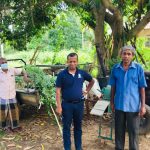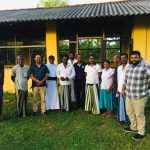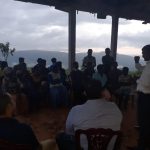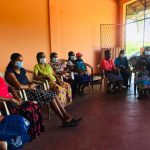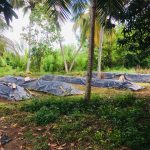Caritas Sri Lanka National Centre team made a Monitoring and Evaluation visit (M & E) to Galle Diocesan Caritas Centre under the “Stepping Stone to Safeguarding Sri Lanka’s Natural Environment Project’ (SSEP) on 30th and 31st March 2022. Rev. Fr Lasantha Fonseka, Director of SED Galle and Mr. Priyantha Indunil SSEP Project Coordinator of the Galle Diocese joined with NC team during the visit.
On the 30th evening, the project team visited a Village Level Environment Group (VLEG) in Fatna Deniyaya. Fatna is a place where thousands of tourists visit and it has been growing in popularity because of the famous ” Broos Gala” waterfall. Around 1000 to 2000 local visitors regularly visit this place every weekend and according to the villagers, the number do escalate to around 5000 during public holidays.
However, due to the presence of large number of visitors, there has been an environmental pollution in the area. The damage is not limited to the environment, but the daily lifestyle of the tea pluckers are also disturbed due to the unruly behaviors of the visitors. Unfortunately, in spite of their appeals to the authorities, the situation has not improved yet.
Therefore, Caritas SED Galle under the SSEP, has given priority in forming a VLEG in that area. Mr M. Manual, SSEP Field Officer and Mr.Ramachandra, President of the Fatna VLEG are looking for ways and means to solve this issue.
The next day, on 31st, M&E team visited a compost producer who has been in the business for the past for 15 years. Mr Sunil has more than 1000 kg of compost storage in his house. But still, he has been facing difficulty to sell these product to the market. SSEP project has identified him as a suitable entrepreneur and agreed to further facilitation in developing his venture.
The next stop was Suriyawalana village. This village has been vulnerable to varied extreme weather patterns and natural disasters such as drought, flood, elephant and crocodile attacks in addition to the drinking water problem. Identifying the issues with the discussion of the villagers, under the SSEP, Caritas has formed a VLEG in this village. Ms Nila Ranjani, President of this VLEG group arranged the meeting. A discussion took place to prioritize the issues in order to seek collaborative solutions. Around 30 members participated in that meeting.
In the evening, the team met another VLEG in Walsapugala. This farmer’s society has been advocating and lobbying for the past years to solve the human-elephant conflict that has ravaged their farming and living. This has been one of the most sensitive and politicized issues that gained worldwide attention recently due to their fast unto death protest. The VLEG members expressed their willingness to learn and to cultivate traditional varieties of paddy. Around 15 village-level community leaders participated in the VLEG discussion.
In conclusion, after the two days of the M&E visit, CSL team identified that SED Galle has carried out the formation of the VLEG groups in areas where sensitive environmental issues are prevalent. At present, the Diocesan team is in the process of identifying the local budding entrepreneurs.


